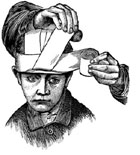
Why Follow Freud?
HARVARD DIARY
Time and again that question which titles this essay has been put to me by others, and in moments of irritation or anger by myself, as I have read particular statements the founder of psychoanalysis made in his various essays and books, not to mention his letters. An immediate and important response ought to be a strong denial that one is, actually, trying to “follow” Freud in any creedal way — a denial that the issue has to do with a commitment to his every word and idea.
He was sometimes a shrewd observer of himself and others, and even if he was also at times wrongheaded or arrogant or self-serving or plain foolish, his better, more edifying moments deserve simple respect, and even continuing gratitude. Unfortunately we all tend to be undiscriminating at various moments and in various ways. Even as Freud anointed his first followers with rings, and banished those who took significant issue with his ideas (thereby setting the stage, in the first decade of this century, for future psychoanalytic orthodoxy), the rest of us are all too revealingly on the hunt for a body of thought that promises to tell us almost everything about ourselves — our origins as individuals; our habits of thought; the nature of our affections; our interests; our likes and dislikes. For every demanding ideology there are, alas, all too many adherents, if not believers.
Sometimes, actually, a later wholesale renunciation of a given person’s thinking tells a lot about our earlier commitment to that thinking. I have met psychiatrists whose present-day scorn for psychoanalysis has been preceded, years ago, by a zealously possessive interest in that discipline’s tenets. In any event, today it is the biological side of psychiatry that entrances many of us (the promise of pills that address the brain’s neurophysiology), and so the old emphasis on talking and listening, on dreams and fantasies (with their symbols, their condensations, their elliptical messages, their extravagant flights of fancy as a means of both revealing and dodging the down-home truths of everyday family living) seems old-fashioned and unpromising. Of course, some of us psychiatrists who are now in our doddering fifties, and can remember the almost messianic fervor with which we took to psychoanalysis, have occasionally had our memories jogged as we listen to certain young neurochemical enthusiasts tell us that there are few psychiatric problems under the sun that Merck and Upjohn and Smith, Kline, French won’t be addressing and solving in the coming decade or two.
You May Also Enjoy
In 1965 my wife, Jane, and I were living in the South, trying to learn…
About five years ago my wife, Jane, a high school teacher of English, and I…
At the end of his collection of stories titled Where I’m Calling From, Raymond Carver…

